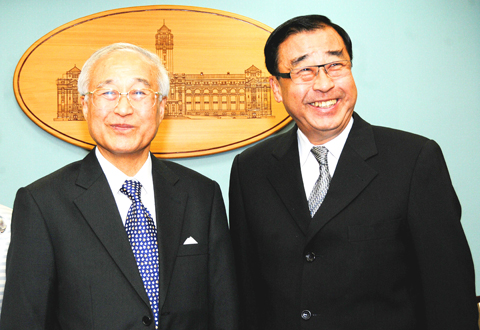This year’s Presidential Science Prize winners were announced yesterday. One of the three winners has a close relationship with a Presidential Office official, while another has close ties to the Chinese Nationalist Party (KMT) administration.
The three winners this year are Chien Shu (錢煦), a member of Academia Sinica and director of the Institute of Engineering in Medicine; Liao I Chiu (廖一久), a member of Academia Sinica and aquaculture professor at National Taiwan University; and Paul Lee (李壬癸), a member of Academia Sinica’s Institute of Linguistics.
Chien is an elder brother of former minister of foreign affairs Fredrick Chien (錢復), while Liao is the elder brother of Presidential Office Secretary-General Liao Liou-yi (廖了以).

PHOTO: CNA
Liao Liou-yi, who introduced the winners to the media yesterday, said President Ma Ying-jeou (馬英九) would present the awards to them at the Presidential Office on Friday.
The biennial award was created by former president Chen Shui-bian (陳水扁) in 2001. Each winner will receive a trophy and a cash prize of NT$2 million (US$62,000).
Chien Shu said he never thought he would win an award when he began his research 30 years ago and that he felt “embarrassed by this undeserved praise.”
He joined Academia Sinica in 1976 and began conducting research at the Department of Bioengineering and Medicine at the University of California, San Diego, in 1988.
Liao I Chiu began his research in aquaculture when he returned to Taiwan in July 1968 after obtaining a doctorate in agriculture in Japan.
His long career at the Taiwan Agricultural Research Institute has helped Taiwan gain a reputation as “the kingdom of breeding,” while Liao has been dubbed “the father of black tiger prawn breeding.”
He was selected as a member of the Academia Sinica in 1992 and has published many papers in national and international publications.
Liao I Chiu thanked his co-workers and family for their assistance and support.
While he once stayed up for seven days and nights observing the activities of shrimps, his wife said this luckily did not happen after they got married.
Lee was the first Taiwanese researcher to profile the migration of Austronesian peoples and make written records of 15 of the Austronesian languages.
He began his research while pursuing his doctoral degree in linguistics at the University of Hawaii from 1967 to 1970.
He has been studying Taiwan’s Austronesian languages and dialects since he joined Academia Sinica in 1970.
Describing his long research career as “forlorn,” Lee said what kept him going was his interest and strong sense of calling.
“If I don’t do it, who will?” he said. “Besides, it is a meaningful job.”

The Coast Guard Administration (CGA) yesterday said it had deployed patrol vessels to expel a China Coast Guard ship and a Chinese fishing boat near Pratas Island (Dongsha Island, 東沙群島) in the South China Sea. The China Coast Guard vessel was 28 nautical miles (52km) northeast of Pratas at 6:15am on Thursday, approaching the island’s restricted waters, which extend 24 nautical miles from its shoreline, the CGA’s Dongsha-Nansha Branch said in a statement. The Tainan, a 2,000-tonne cutter, was deployed by the CGA to shadow the Chinese ship, which left the area at 2:39pm on Friday, the statement said. At 6:31pm on Friday,

The Chinese People’s Liberation Army Navy’s (PLAN) third aircraft carrier, the Fujian, would pose a steep challenge to Taiwan’s ability to defend itself against a full-scale invasion, a defense expert said yesterday. Institute of National Defense and Security Research analyst Chieh Chung (揭仲) made the comment hours after the PLAN confirmed the carrier recently passed through the Taiwan Strait to conduct “scientific research tests and training missions” in the South China Sea. China has two carriers in operation — the Liaoning and the Shandong — with the Fujian undergoing sea trials. Although the PLAN needs time to train the Fujian’s air wing and

The American Institute in Taiwan (AIT) put Taiwan in danger, Ma Ying-jeou Foundation director Hsiao Hsu-tsen (蕭旭岑) said yesterday, hours after the de facto US embassy said that Beijing had misinterpreted World War II-era documents to isolate Taiwan. The AIT’s comments harmed the Republic of China’s (ROC) national interests and contradicted a part of the “six assurances” stipulating that the US would not change its official position on Taiwan’s sovereignty, Hsiao said. The “six assurances,” which were given by then-US president Ronald Reagan to Taiwan in 1982, say that Washington would not set a date for ending arm sales to Taiwan, consult

A Taiwanese academic yesterday said that Chinese Ambassador to Denmark Wang Xuefeng (王雪峰) disrespected Denmark and Japan when he earlier this year allegedly asked Japan’s embassy to make Taiwan’s representatives leave an event in Copenhagen. The Danish-language Berlingske on Sunday reported the incident in an article with the headline “The emperor’s birthday ended in drama in Copenhagen: More conflict may be on the way between Denmark and China.” It said that on Feb. 26, the Japanese embassy in Denmark held an event for Japanese Emperor Naruhito’s birthday, with about 200 guests in attendance, including representatives from Taiwan. After addressing the Japanese hosts, Wang